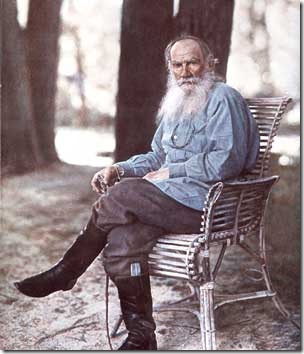I read Tolstoy’s Confessions in Kaua’i. It was disjointing. Like someone you trust telling you that the Pope is really Episcopalian. The beauty of the land and sea set along the craggy dog-howl depths of Leo was like a slap to the cranium. Picture that Bolshevik in a grass skirt and you’re getting close to my mental segregation.
 I never managed War and Peace however many years ago, although it’s all fog to me now, I did read Anna Karenina. But in Confessions and Other Religious Writings (translated by Jane Kentish) he repudiates both works as vanities regretting there are people still left for whom they are necessary. Tolstoy called Anna Karenina "an abomination that no longer exists for me." Instead he set himself to what he saw as his real work. Writing about and practically championing Christian humanism.
I never managed War and Peace however many years ago, although it’s all fog to me now, I did read Anna Karenina. But in Confessions and Other Religious Writings (translated by Jane Kentish) he repudiates both works as vanities regretting there are people still left for whom they are necessary. Tolstoy called Anna Karenina "an abomination that no longer exists for me." Instead he set himself to what he saw as his real work. Writing about and practically championing Christian humanism.
Tolstoy arrived at Christian Humanism through a long religious struggle. No doubt the seeds of this struggle are in his earlier novels, but it was later when he set his intellect and energy to finding some kind of key to human existence that death could not obliterate. (He was often suicidal during this search.) For more than a decade of study and pursuit of other religions, and after working through the illogic of religion, he came to believe that religion nevertheless contained the highest expression of human purpose. And in an extensive study of Jesus, he came to believe that the essence of Christ’s teaching was the equality of all people and the “doctrine” of love and nonviolence. He believed that this provided a way toward the perfection of humanity.
He wrote prodigiously and scathingly about the distortions of the church and the evil of autocracy. Meanwhile he actively worked for the reform of peasant schools and for the protection of persecuted religious sects, especially the Doukhobors. And during Russia’s late century famine he put his energy to relief work.
Tolstoy became a dangerous figure for the state and the church. By the turn of the century it was a punishable offense to own any of Tolstoy’s writings, save his early novels. His forceful egalitarian stand undermined church dogma and hierarchy as well as political oligarchy.
Interestingly, his most lasting influence was in India. In the early 20th century he and Gandhi had begun a correspondence that lasted many years. Gandhi often referred to himself as a humble follower of Tolstoy.
Tolstoy had little patience for Christianity’s addendums. All those things denominations hold dear. He, like Gandhi, was all about the practical recognition of the "kingdom of God" within each of us.

Beautiful, Steve. Might I simply add – the kingdom “among” us.
You might indeed!
Okay, now you’ve ruined my day. Your suggestion of Bolsheviks in grass skirts is haunting. I will not ask you to characature the Harper government or I won’t get anything done for weeks!!!